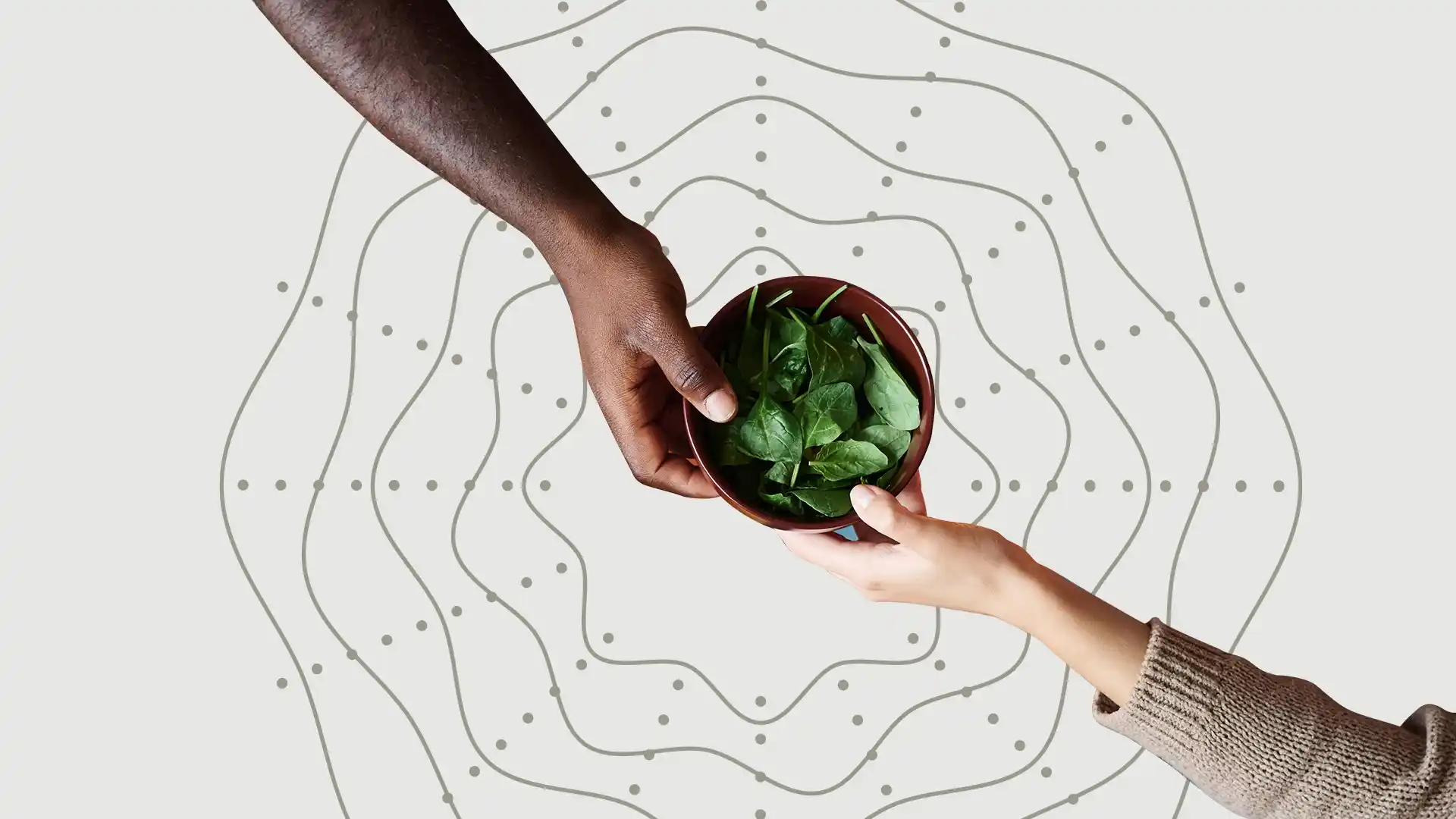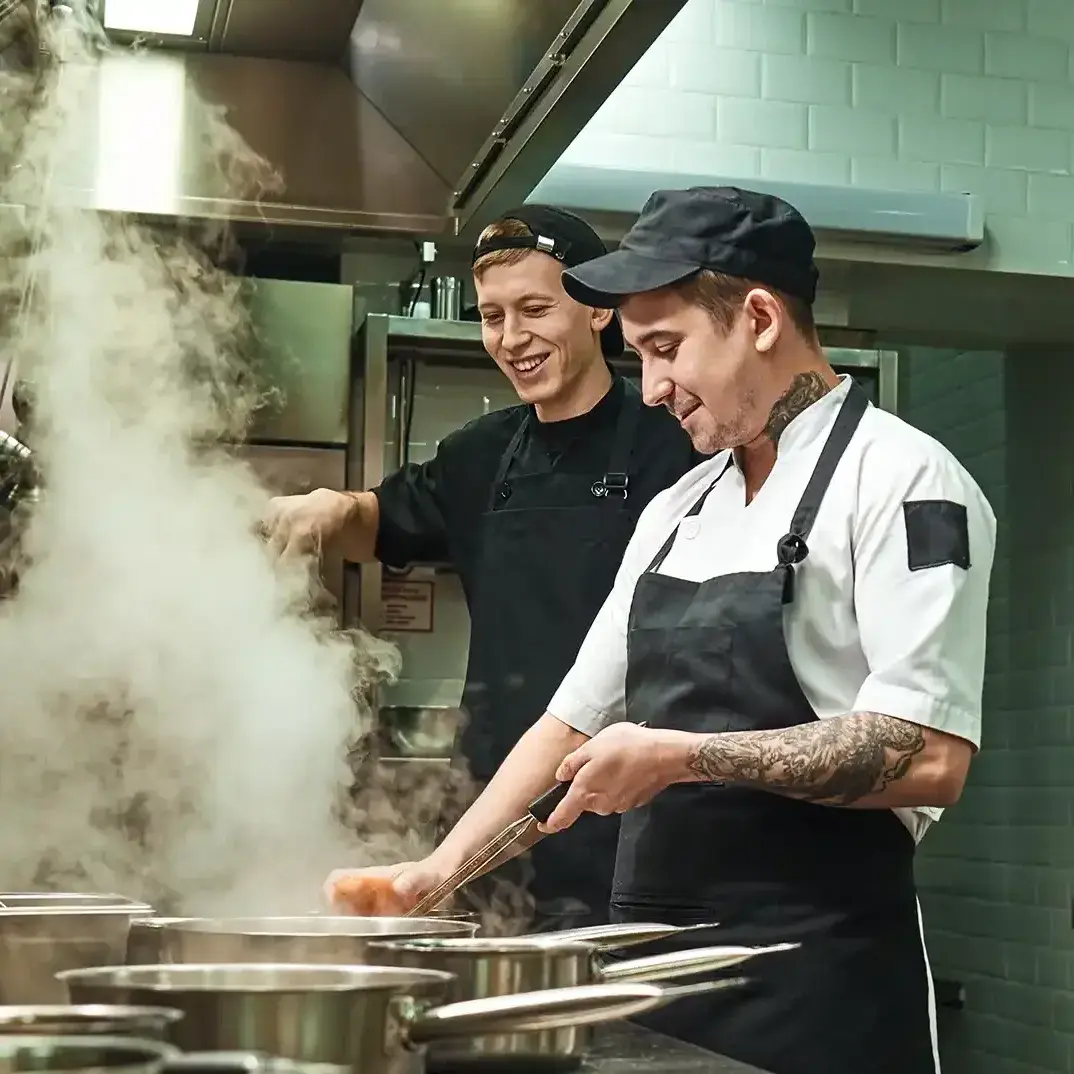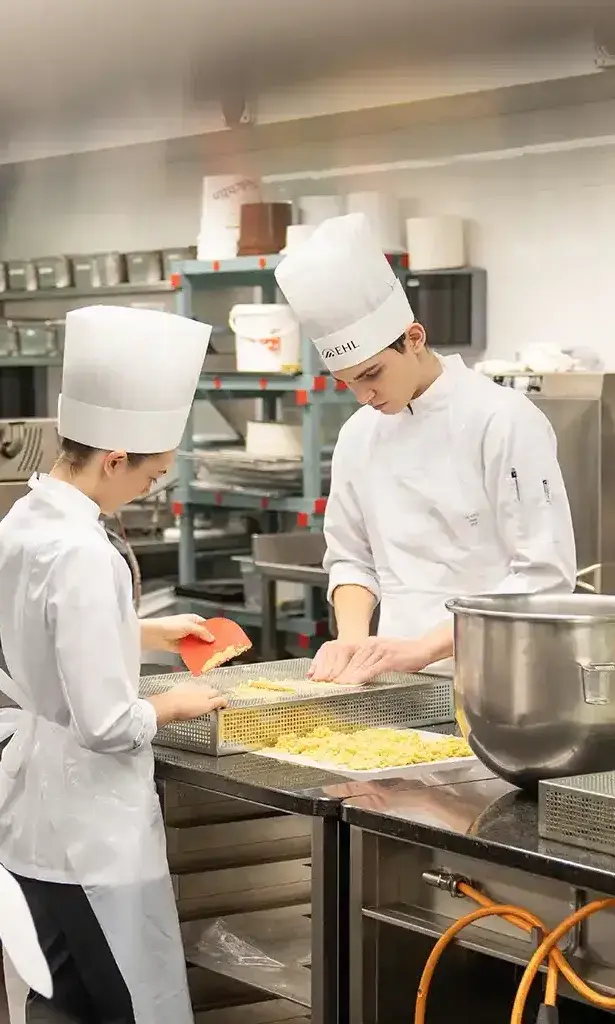
Who is responsible for guiding our food choices?
The responsibility for nutrition, well-being and food choices should be shared among individuals, businesses, chefs and governments, requiring collective action rather than isolated efforts. Modern food systems, while offering convenience and abundance, often create environments that do not help individual efforts to make healthier choices. Processed foods dominate many diets and consumers are bombarded with marketing messages encouraging them to prioritize instant gratification over long-term health. In such an environment, it is unrealistic to expect individuals to carry all responsibility.
"Government and hospitality must work hand in hand to make healthy food more accessible to everyone"
President and CEO of the Culinary Institute of America, Michiel Bakker, advocates for co-responsibility. Policies that promote sustainable and health-conscious food systems are critical, and governments play a central role by setting regulatory frameworks that incentivize healthier food production and equitable access. Businesses should adopt ethical practices that prioritize consumer health and environmental sustainability, while chefs and food leaders have the opportunity to use their platforms to educate and empower consumers, designing menus and experiences that support better choices without sacrificing flavor or culture.
Communities and social structures also play a part in shaping dietary habits and food culture. The shared responsibility extends to how we collectively value food, prioritize health and support access to nutritious options. This shared approach not only addresses immediate challenges like diet-related diseases but also tackles systemic issues such as food insecurity and climate change, creating a more sustainable and equitable food culture.

The role of schools and workplaces
Continuous education and awareness are foundational to developing a sense of co-responsibility. Early food literacy programs in schools and the community, as well as workplace initiatives, can instill an understanding of how food choices impact health, environment and society. For example, workplaces have emerged as influential environments for promoting healthier lifestyles. They provide opportunities to shape food offerings and educate employees about the benefits of balanced diets, sustainable sourcing and reduced waste. By embedding these practices into daily operations, workplaces can become microcosms of a broader culture of well-being and sustainability.
“Food literacy is a right, not a luxury—it’s time to make food education as central as math and history”
In institutional settings such as corporate, school or college campuses, food service providers have an added responsibility to support consumers. Companies like Bon Appétit Management Company integrate wellness guidance into their operations, from offering intuitive eating principles to reducing the stigma of bad dietary decisions. This reflects a shift from overeducation to creating environments that naturally encourage healthier choices.
Case:
Chefs Brigade is a great example impacting the next generation through healthy school meals. This organization brings together chefs with a mission to revolutionize the way food is prepared and served, especially in institutional settings like schools. By using their culinary expertise and innovative approach, chefs transform nutritious ingredients into meals that are healthy, enjoyable and stay within the often-limited school budgets.
Chefs Brigade exemplifies this by empowering chefs to create flavor-packed, balanced meals that meet nutritional standards while appealing to a wide audience, especially children. This approach helps dismantle the perception that healthy eating is bland or unattractive, proving that with the right creativity and skill, plantforward and nutritious meals can become everyday favorites. By focusing on quality, taste and presentation, chefs can drive meaningful change in how people, especially younger generations, engage with healthy, sustainable food.
Case:
Google showcases how workplaces can foster well-being and community through innovative food programs, e.g., by prioritizing balanced diets, offering nutrient-dense meals and promoting plant-based options. Google supports healthier lifestyles among employees without imposing but rather eliminating access friction, directly influencing well-being as well as productivity and creativity. Sustainability is central to its operations, with initiatives like AI-driven food waste reduction and locally sourced ingredients minimizing environmental impact. Additionally, Google uses food to build community, creating shared spaces and hosting "teaching kitchens" to connect employees through collaborative dining experiences.
Through subtle education and behavior-guiding initiatives, Google encourages employees to make informed food choices that benefit both personal wellbeing and the planet beyond the office. Google Foods exemplifies how workplaces can become microcosms of well-being and sustainability, inspiring organizations worldwide.
The role of chefs and the F&B sector
According to the Edelman Trust Barometer (2024), trust in the food and beverage sector remains high, with 72% of global respondents expressing confidence in this industry. Importantly, chefs and hospitality professionals are seen as influential figures who can help bridge the gap between innovation and consumer trust. The findings highlight that people are increasingly turning to trusted sources, including scientists and peers, for reliable information about food and innovation, with 74% of respondents expressing confidence in these groups.
This positions chefs as both innovators and trusted voices in guiding consumers towards healthier, more sustainable food choices. By embracing plant-forward diets and showcasing creative ways to prepare nutritious meals, chefs can lead the charge in making sustainable eating both desirable and accessible, aligning with broader consumer expectations for transparency and ethical food practices.

"In Brazil, food sustainability has emerged as a significant trend, yet many people remain at the surface, not fully understanding its deeper implications. This is where we as chefs can help”
In addition to developing sustainable diets, chefs and cooks also have a significant role in addressing food waste (explored further in trend no. 5). However, Mark Brand, chef and food activist, warns that while chefs have a responsibility to promote well-being and sustainable practices, "greenwashing" within the industry is very present where marketing overshadows genuine sustainability efforts. For meaningful impact, chefs should embrace transparency and authenticity in their sourcing and operations as a starting point.
Line cooks and servers
According to our expert interviews and the 2024 Trends in Climate Smart Eating report, line cooks and servers are increasingly recognized as change agents in promoting climate-smart eating as they support customers with healthier choices if trained accordingly [74]. While chefs and foodservice operators play a central role in menu design, hourly staff such as line cooks and servers have direct, influential interactions with diners that can guide them towards better choices [74].
When line cooks understand the personal and creative value of plant-forward, healthier cooking, for example, their enthusiasm and empathy translate onto the plate, making sustainable and healthy options more appealing to guests. Likewise, front-of-house staff can subtly influence diners through informed recommendations and storytelling, making their engagement vital to the success of climate-smart and health initiatives.

"Train your team to be the voice of your story, bringing the journey and purpose of the food to life. When they stand in front of the client, it’s not just about service—it’s about creating a moment of connection and meaning"
A recent report by Foodward, ZHAW and Gastrofutura (2023) [75] highlights that storytelling is one of the most effective ways for restaurants to make meals more enjoyable and meaningful for guests. By explaining where ingredients come from and how they’re sourced or prepared sustainably, restaurants can help guests feel more connected to their food. Sharing these details, either through staff or menus, makes meals more appreciated. Guests value meals more when they feel informed and engaged [76].
Securing buy-in at every level, from executives to hourly staff, is key for such initiatives to succeed [74]. Strategies to engage staff include involving them in the development of dishes, providing recognition through certificates or acknowledgments, and delivering accessible training [74]. Such training should include guidance on how to effectively communicate sustainable practices to better engage the clientele and promote healthy food initiatives. Furthermore, operational ease is a critical factor, e.g., configuring point-of-sale systems to streamline plant-based substitutions.
The Food for Climate League’s work with the Good Eating Company demonstrated that after education on the benefits of sea vegetables, the intention to offer these options grew from 17% to 71%. Google’s Global Culinary Inspiration Program co-developed with Food for Climate League, similarly, empowers chefs and cooks, igniting intrinsic motivation that enhances sustainable offerings and elevates dining experiences.
Culinary leaders as changemakers
Groups like the Chef's Manifesto and Social Gastronomy Movement can serve as a guiding tool for chefs and industry players as they promote a systemic approach to food issues and look at food as part of an interconnected system involving nutrition, sustainability, social inclusion and diversity. By adhering to such principles, industry players can contribute meaningfully to global food sustainability and inclusion goals.
.jpg)
"Chefs are the translators of our food system—they balance taste, texture, and health on every plate"
Paul Newnham, CEO and Founder of Chefs Manifesto and the SDG Hub, notes that even in larger hospitality settings where chefs may feel they have limited influence, they can still shape food practices within their organizations. By educating themselves on the impacts of their food choices and advocating for thoughtful, sustainable procurement, chefs can influence both their businesses and their customers' perspectives on food.
Cases:
In the field of social gastronomy, chefs like Ebru Baybara Demir and David Hertz are pioneering role models who use food as a catalyst for social change and community resilience. Ebru Baybara Demir, a celebrated Turkish chef, has implemented numerous projects that focus on empowering local communities, especially refugees, through sustainable agriculture and food production. One of her signature initiatives, From Soil to Plate, trains Syrian and Turkish women in sustainable farming, food security and economic independence. Her remarkable contributions have earned her recognition on a global scale, including the Basque Culinary World Prize and Food & Agriculture Organization Food Hero, which she received for her social impact through food.
Similarly, David Hertz, Brazilian chef and founder of Gastromotiva, has transformed the lives of underserved communities by offering culinary training programs that create job opportunities in the hospitality sector. His work has expanded to food waste and community kitchens. He was one of the first to work with the term of Social Gastronomy. Hertz’s dedication has garnered international awards, including the Schwab Foundation Social Entrepreneur of the Year, Ashoka fellow and UN Food Systems Champion.
Both Demir and Hertz exemplify how chefs can go beyond the kitchen to address urgent social issues, serving as inspiring figures for the global culinary community.
Reinventing education through transdisciplinary approaches
There is a growing expectation for chefs and hospitality professionals to promote healthier and more sustainable food options, a task that requires equipping them with the right tools and training. To truly meet the rising demand for responsible dining, educational models for hospitality professionals need to adopt a more transdisciplinary approach. While chefs are increasingly entrusted with guiding healthy and sustainable food choices, they would benefit greatly from training that goes beyond culinary skills to include insights on nutrition, environmental science and food literacy.
.jpg)
“Education is key. If we teach our employees to be healthier and happier, our customers will feel it too”
Unfortunately, many current educational offerings lack the holistic perspective essential to meet today’s increasingly informed consumer demands. Programs centred on food literacy, nutrition, climate-conscious sourcing and waste reduction could be providing future chefs and food service operators with the knowledge needed to lead responsibly. This approach not only supports the broader objectives of the Planetary Health Diet but also equips the next generation of hospitality professionals with the skills to foster a sustainable and resilient food system.
Research further highlights that culinary medicine (CM) and culinary nutrition (CN) education are promising avenues for improving food quality and addressing chronic diseases. Programs designed for health professionals and culinary students have demonstrated favourable outcomes, including enhanced culinary skills, increased nutrition knowledge and healthier eating habits [77]. Integrating such education into hospitality training can bridge gaps in food knowledge, empowering chefs to understand both the nutritional and environmental impacts of their ingredients.
Institutions such as the Future Food Institute in Italy and the Food for Climate League in the United States already supplement traditional educational training initiatives, emphasizing a transdisciplinary curriculum that spans environmental science, nutrition and systems thinking. The Future Food Institute offers immersive courses that bridge culinary practices with planetary stewardship, as well as a new program preparing "Agri-chefs"—professionals who link agriculture with gastronomy by learning to cook directly from the land they work on. This model encourages chefs to connect with soil health, local biodiversity and sustainable sourcing, positioning them as educators and advocates for regenerative food practices.

"Agri-chefs are the new pioneers—blending farming and cooking to nourish both people and the planet"
The Food Climate League asserts building climate literacy within the food industry to inspire climate-positive choices. Notably, EHL Group has also made sustainability a transversal priority across its courses, embedding it within every facet of the curriculum to prepare hospitality professionals for the demands of a more sustainable future. The EHL Sustainability Lab at the EHL Passugg Campus stands out for its innovative approach to exploring interconnected systems. By collaborating with the Framers School Planta Hof, the lab delves into upstream and downstream cycles, encouraging students to think beyond their primary sector. This initiative promotes a holistic understanding of sustainability, bridging agriculture, hospitality and environmental stewardship to prepare students for the complexities of sustainable practices in the industry.
Before the educational offer catches up on a large-scale, cross-sector collaborations between food outlets and nutritionists or doctors will allow for advancement.
"It's not just about what's on your plate—it's about the choices behind it"
Industry recommendations
- Continuous learning and training: Encourage teams to engage in ongoing learning and training that incorporates transdisciplinary approaches and practical skills to address modern food challenges.
- Empower line cooks and servers: Train line cooks and servers to promote climate-smart and healthy eating options, as they have direct interactions with diners and can guide them toward better choices.
- Promote shared responsibility: Encourage collective action among individuals, businesses, chefs and governments to improve nutrition and well-being, rather than relying on isolated efforts.
- Storytelling and guest engagement: Use storytelling to make meals more enjoyable and meaningful, helping guests feel connected to their food by sharing information about ingredient origins and sustainable practices.
- Transdisciplinary education: Revamp educational models for hospitality professionals to adopt a transdisciplinary approach, including training in nutrition, environmental science and food literacy.
- Workplace initiatives: Utilize workplaces as influential environments for promoting healthier lifestyles by shaping food offerings and educating employees about balanced diets.

Report created with the support of:
© 2026 EHL Holding SA, Switzerland. All rights reserved.